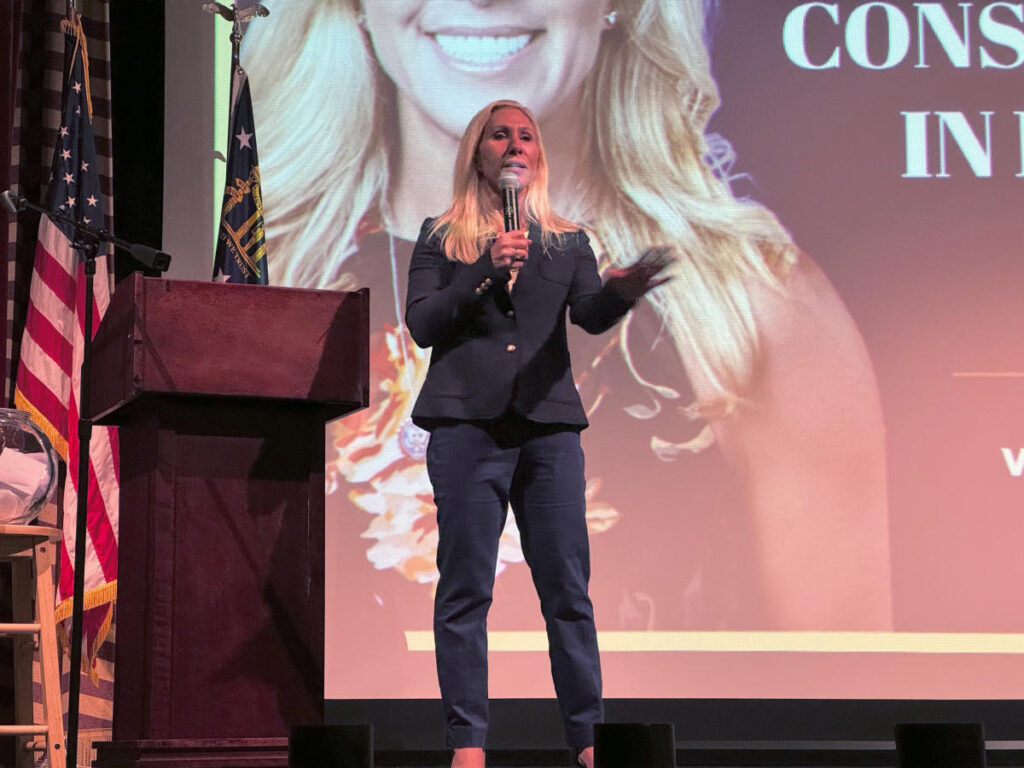In the Georgia 14th District, a Republican stronghold near Atlanta, a recent town hall meeting showcased the divide in political support as voters gathered in support of U.S. Rep. Marjorie Taylor Greene. Despite her solid base, Greene faces opposition from Democrat Shawn Harris, a retired Army General and farmer, who criticized Greene’s extreme rhetoric and alleged neglect of local issues. Harris’s campaign faces significant challenges, especially as many attendees at the town hall remained unaware of his candidacy, illustrating the uphill battle he faces in garnering recognition and support in a predominantly Republican area.
During the town hall, supporters cheered Greene’s contentious political antics and her ties to former President Donald Trump. Greene has made headlines for her controversial statements, including recently blaming Democrats for Hurricane Helene, and for her attempts to challenge Republican House Speaker Mike Johnson. Despite her striking claims, which included unfounded assertions about immigration and the 2020 election results, Greene’s focus on national issues resonated with her audience, although some attendees noted a desire for more discussion on her accomplishments within the district.
Harris, in contrast, presents himself as a candidate focused on tangible solutions for his constituents. He expressed ambitions to improve veterans and seniors’ services, expand healthcare access, create mental health facilities, and promote economic development by establishing a freight hub in the district. Harris asserted that every individual in his district, irrespective of their background, deserves more than what Greene has offered in her three years in office, arguing that Greene has not delivered substantive results. His approach is to emphasize local issues that directly impact the community.
Harris’s fundraising efforts highlight his challenge against a well-known opponent. Although he has raised around $522,000—considered a significant amount for a newcomer—it pales in comparison to the $15 million raised by Marcus Flowers, who lost to Greene in 2022. Despite Harris’s local roots and commitment to community needs, many Democratic donors contribute to his campaign largely out of disdain for Greene, rather than a strong belief in Harris’s viability as a candidate. This further suggests that dissatisfaction with Greene, rather than robust support for Harris, may drive some financial backing.
Local Republican voters, however, are largely devoted to Greene, as demonstrated by the prevalence of signs supporting both her and Trump in neighborhoods across the district. The prevailing sentiment among many voters is that national issues matter more than local concerns, a reality that benefits Greene as she appeals to populist sentiments and solidifies her base. Political strategist Brian Robinson notes that the demand for national discourse drives Greene’s political strategy, allowing her to maintain popularity despite her divisive antics.
Ultimately, while Harris aims to provide a necessary alternative, the loyalty many voters show to Greene and her nationalist rhetoric poses a significant barrier. His candidacy sparks a conversation about the needs and aspirations of residents in northwest Georgia, yet it remains unclear whether this can resonate with a voter base increasingly aligned with Greene’s extreme views. Harris’s campaign highlights the critical balance between local engagement and national discourse in electoral politics, particularly in a polarized climate where established narratives often overshadow grassroots concerns.

